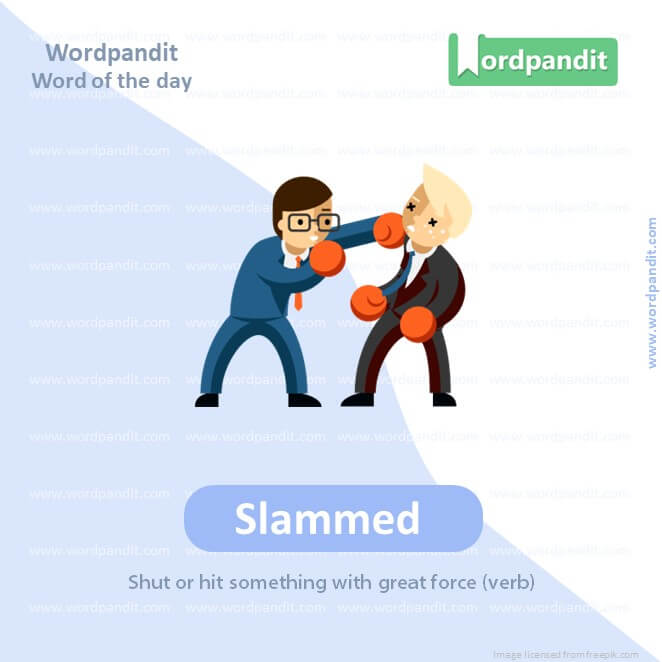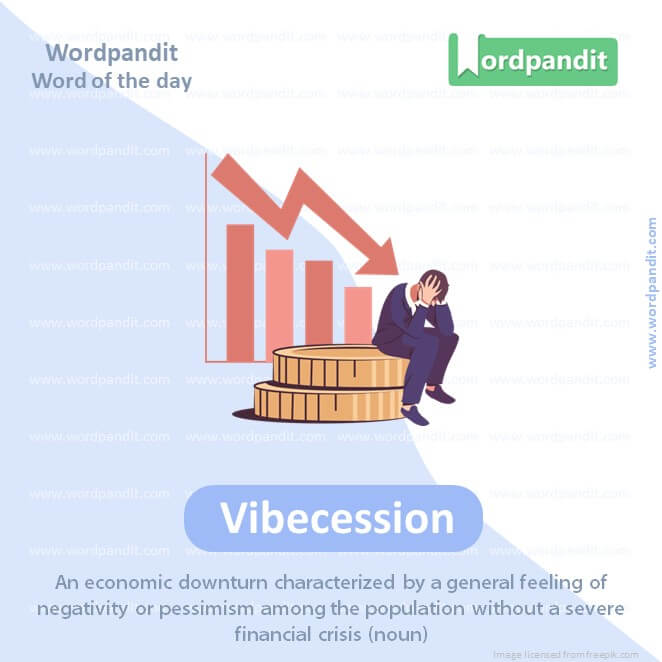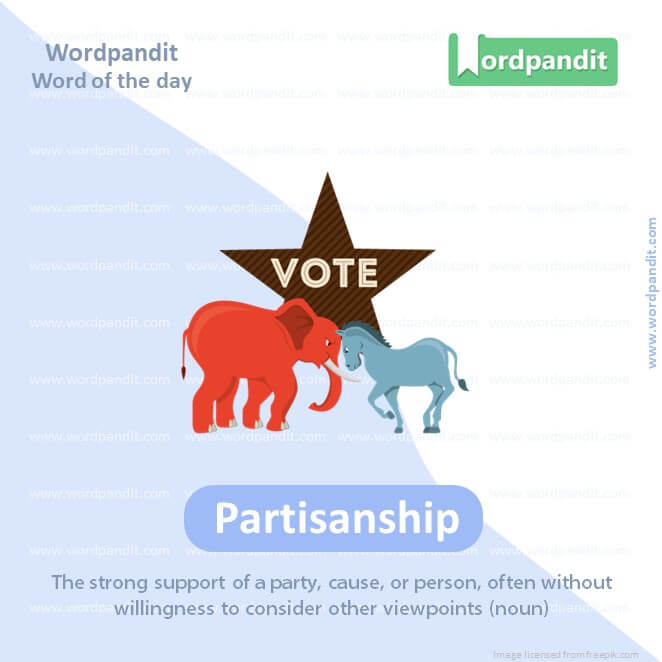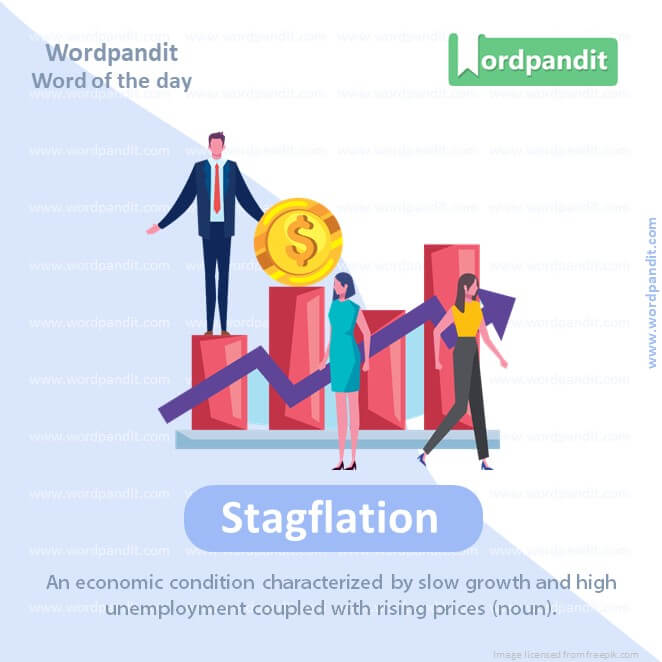Daily Vocabulary Words: List of Daily Used Words in Leading International Newspapers
Hi there. Welcome to this special section @ Wordpandit.
Our endeavour here is very simple: to highlight important daily vocabulary words, which you would come across in leading newspapers in the country. We have included the following newspapers in our selection:
• The New York Times
• The Washington Post
• Scientific American
• BBC
• The Guardian
• Psychology Today
• Wall Street Journal
• The Economist
We are putting in extensive work for developing your vocabulary. All you have got to do is be regular with this section and check out this post on a daily basis. This is your repository of words that are commonly used and essentially, we are posting a list of daily used words. Hence, this has significant practical application as it teaches you words that are used commonly in leading publications mentioned above.
Visit the website daily to learn words from leading international newspapers.

WORD-1: Slammed
CONTEXT: the economy was body-slammed by the Covid-19 pandemic, but we have more than recovered.
SOURCE: New York Times
EXPLANATORY PARAGRAPH: If you’ve ever closed a door really hard because you were running too fast or maybe feeling upset, that sound it makes is because the door was “slammed.” It means to shut something with a lot of force so it makes a loud noise. People can also use this word when they’re very busy or if they speak very strongly about not liking something.
MEANING: Shut or hit something with great force (verb)
PRONUNCIATION: SLAM’d
SYNONYMS: Banged, smacked, criticized, overloaded, busy
USAGE EXAMPLES:
1. She slammed the door in frustration.
2. The book was slammed by critics for its poor writing.
3. He’s been slammed with work all week.
4. The chef slammed the kitchen counter after dropping a plate.

WORD-2: Vibecession
CONTEXT: More often than not, anyone who argues that we’re in a “vibecession,” in which public perceptions are at odds with economic reality, gets tagged as an elitist, out of touch with people’s real-life experience
SOURCE: New York Times
EXPLANATORY PARAGRAPH: Imagine if people in a town are usually happy and buy lots of toys, but then they start feeling a bit sad and stop buying as many toys, even though they still have their allowances. They’re not super sad, just not as happy. This is like a “vibecession.” It’s when things in a big place like a country aren’t going bad, but they’re not doing great either, and people are feeling it.
MEANING: An economic downturn characterized by a general feeling of negativity or pessimism among the population without a severe financial crisis (noun).
PRONUNCIATION: VYB-seh-shun
SYNONYMS: Slowdown, downturn, slump, decline, dip
USAGE EXAMPLES:
1. Many believe the country is in a vibecession due to the recent decline in consumer confidence.
2. Retailers are feeling the effects of the vibecession.
3. Experts debate whether the current economic situation qualifies as a vibecession.
4. The mood of the nation suggests a vibecession, despite no official recession being declared.

WORD-3: Partisanship
CONTEXT: The elephant in the room — and it is mainly an elephant, although there’s a bit of donkey too — is partisanship.
SOURCE: New York Times
EXPLANATORY PARAGRAPH: Imagine if your school playground is divided into two teams: one that loves playing with blue balls and another that loves playing with red balls. Each team thinks their color is the best and doesn’t want to play with the other color. This is like “partisanship.” It’s when people support their team or group so much that they don’t want to agree with or even listen to the other side.
MEANING: The strong support of a party, cause, or person, often without willingness to consider other viewpoints (noun).
PRONUNCIATION: PAR-ti-zuhn-ship
SYNONYMS: Bias, favoritism, one-sidedness, allegiance, loyalty
USAGE EXAMPLES:
1. The debate was marked by strong partisanship, with neither side willing to compromise.
2. He was criticized for his partisanship in political discussions.
3. Partisanship can prevent effective governance.
4. The legislation was passed despite the partisanship in the Senate.
WORD-4: Aversion
CONTEXT: Inflation aversion doesn’t explain why people think their state is doing well but the nation is a mess.
SOURCE: New York Times
EXPLANATORY PARAGRAPH: Think about when you see a food you really don’t like, and you make a face because you don’t even want to taste it. That feeling of not wanting something because it makes you feel yucky is called an “aversion.” It’s like having a big “no thank you” to something.
MEANING: A strong dislike or disinclination towards something (noun).
PRONUNCIATION: uh-VER-zhuhn
SYNONYMS: Dislike, distaste, hatred, loathing, repugnance
USAGE EXAMPLES:
1. She has an aversion to spiders.
2. His aversion to crowded places made him avoid concerts.
3. Many people have an aversion to speaking in public.
4. Trying new foods is difficult for those with an aversion to textures.

WORD-5: Stagflation
CONTEXT: Last year were roughly as negative about the economy as they were in the aftermath of the 2008 financial crisis and during the stagflation of 1980 — so the fact that a Democrat is president drags down average consumer sentiment.
SOURCE: New York Times
EXPLANATORY PARAGRAPH: Imagine if the price of your favorite candy keeps going up, so it’s harder to buy it with your allowance. At the same time, your allowance doesn’t get any bigger, and maybe some of your friends can’t find chores to earn money. This situation, where things cost more but not more money is being made or jobs are hard to find, is called “stagflation.”
MEANING: An economic condition characterized by slow growth and high
unemployment coupled with rising prices (noun).
PRONUNCIATION: STAG-flay-shuhn
SYNONYMS: Inflation, economic slowdown, recession, high prices, unemployment
USAGE EXAMPLES:
1. The country faced stagflation in the 1970s.
2. Stagflation makes it hard for people to afford everyday items.
3. Economic policies aim to avoid stagflation.
4. The economist discussed the potential for stagflation in the current economy.
WORD-6: Vindicates
CONTEXT: If you ask me, more progressives should celebrate the current economy, not just to help Biden get re-elected, but because economic success vindicates the progressive vision.
SOURCE: New York Times
EXPLANATORY PARAGRAPH: Imagine if someone blamed you for eating the last cookie, but then your sibling said, “No, I did it!” Your sibling’s confession proves you didn’t eat the cookie, and now everyone knows you didn’t do it. That’s what “vindicates” means. It’s when something shows that you were right or not at fault, just like clearing your name from the cookie mystery.
MEANING: To clear someone of blame or suspicion; to show or prove to be right, reasonable, or justified (verb).
PRONUNCIATION: VIN-duh-kates
SYNONYMS: Exonerate, absolve, justify, acquit, exculpate
USAGE EXAMPLES:
1. The evidence vindicates her of the crime.
2. He was vindicated when the true story came to light.
3. The decision to prepare in advance was vindicated when the storm hit.
4. The new findings vindicate the scientist’s theory.

WORD-7: Contrary
CONTEXT: I’d argue that Biden deserves some credit for the good news, but the more important point is that policies like the expansion of Obamacare and student debt relief have not, contrary to conservative predictions, dragged the economy down — which means that it’s OK to call for more.
SOURCE: New York Times
EXPLANATORY PARAGRAPH: Imagine you say that ice cream is the best dessert, but your friend says that cake is actually the best. Your friend is taking a “contrary” position, which means they’re saying the opposite of what you’re saying. It’s like when someone disagrees and goes in a different direction with their opinion.
MEANING: Opposite in nature, direction, or meaning (adjective).
PRONUNCIATION: KON-trair-ee
SYNONYMS: Opposite, opposing, different, reverse, adverse
USAGE EXAMPLES:
1. Despite the contrary weather forecast, the day was sunny and warm.
2. His actions were contrary to the rules.
3. She held a contrary opinion on the matter.
4. The results were contrary to our expectations.
WORD-8: Appendectomy
CONTEXT: I’ve been “around” many physicians in my life. You do not want me performing your appendectomy.
SOURCE: New York Times
EXPLANATORY PARAGRAPH: If you have a tiny part inside your belly called the appendix, and it gets sick, doctors need to do a special job to take it out so you can feel better. This job is called an “appendectomy.” It’s like when you have a splinter, and someone carefully removes it, but for your inside belly part.
MEANING: A surgical operation to remove the appendix (noun).
PRONUNCIATION: ap-pen-DEK-tuh-mee
SYNONYMS: Surgery, operation, removal, excision, procedure
USAGE EXAMPLES:
1. He had to have an appendectomy when his appendix became inflamed.
2. The surgeon performed an appendectomy.
3. Recovery from an appendectomy usually takes a few weeks.
4. An appendectomy is a common procedure.
WORD-9: Impulse
CONTEXT: I understand the impulse to open government to people who aren’t mired in conventional thinking, who aren’t bound by party loyalties, who promise truly fresh perspectives, who can inspire us by surprising us. I support it — within reason.
SOURCE: New York Times
EXPLANATORY PARAGRAPH: Have you ever suddenly wanted to jump in a puddle or buy a toy right when you saw it? That quick feeling that makes you want to do something without thinking about it first is called an “impulse.” It’s like when your body or brain says “let’s do this!” before you can even decide if it’s a good idea.
MEANING: A sudden strong desire to do something without thinking about the consequences (noun).
PRONUNCIATION: IM-puls
SYNONYMS: Urge, instinct, whim, desire, compulsion
USAGE EXAMPLES:
1. She bought the dress on an impulse.
2. He had an impulse to jump into the lake.
3. Acting on impulse, he booked a flight to Paris.
4. Impulse buying can lead to regret later.
WORD-10: Flummoxed
CONTEXT: The New Empire,” taking a charitable tack: “Part of the film’s charm is that the humans are often flummoxed; they tend to know where the creatures are headed, but rarely why or what they can do to help, a relatable frustration for anyone who has ever dragged their pet to the vet and gotten a diagnosis of stress.”
SOURCE: New York Times
EXPLANATORY PARAGRAPH: Imagine you’re trying to solve a really tricky puzzle, and no matter how much you look at it, you just can’t figure it out. That feeling of being so confused and not knowing what to do next is what “flummoxed” means. It’s like your brain is saying, “I don’t understand this at all!”
MEANING: Bewildered or perplexed (adjective).
PRONUNCIATION: FLUH-mukst
SYNONYMS: Confused, baffled, bewildered, puzzled, stumped
USAGE EXAMPLES:
1. The complex math problem left him flummoxed.
2. She was flummoxed by the instructions.
3. The mystery novel flummoxed its readers with its unexpected ending.
4. His sudden change of mood flummoxed her.
Vocabulary List English
In the vibrant marketplace of language learning, a ‘vocabulary list English’ is akin to a beautifully stocked grocery list – a tool that equips learners with basic ingredients necessary for fluent communication. However, absorbing the ‘vocabulary list English’ proficiently requires more than mere memorization; it calls for an informed and strategic method of learning.
The initial step towards mastering ‘vocabulary list English’ involves adopting an interactive approach. Instead of just reading and revising, use flashcards or digital memory tools to make the process more engaging. Such modes of learning not only retain interest but also boost retention and comprehension.
When learning ‘vocabulary list English’, practice is a fundamental element. Use these words in routine conversations, emails, or social media posts. The more frequently you use the words, the swiftly their usage becomes second nature.
A crucial part of understanding ‘vocabulary list English’ lies in knowing the context. Simply knowing a word’s meaning isn’t enough; you must know how it’s used in different situations. Reading a variety of materials, from fiction and newspapers to blogs and digital content, offers insight into the practical application of these words, deepening your understanding.
Furthermore, it’s vital to frequently revise ‘vocabulary list English’. Call back to what you’ve learned and give it another run-through. This habit strengthens memory retention and enhances the likelihood of the words being accessible when needed.
In conclusion, mastering ‘vocabulary list English’ is achieved through a blend of engaging tools, active practice, contextual understanding, and regular revision. These strategies, combined, can make the task of mastering ‘vocabulary list English’ a less overwhelming and more rewarding journey. As you venture into this process, you grow and expand your English vocabulary, achieving a heightened level of fluency and confidence in your English communication abilities.







